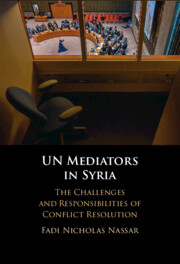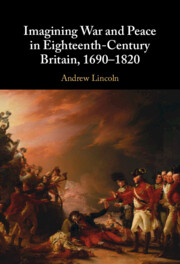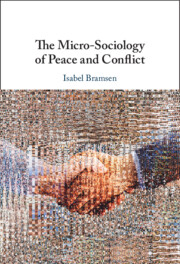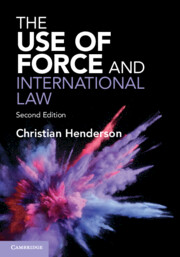179 results
4 - War, Peace and Interstate Relations
-
-
- Book:
- The Cambridge Comparative History of Ancient Law
- Published online:
- 09 May 2024
- Print publication:
- 30 May 2024, pp 146-180
-
- Chapter
- Export citation
1 - Introduction
-
- Book:
- UN Mediators in Syria
- Published online:
- 16 May 2024
- Print publication:
- 23 May 2024, pp 1-34
-
- Chapter
-
- You have access
- HTML
- Export citation

UN Mediators in Syria
- The Challenges and Responsibilities of Conflict Resolution
-
- Published online:
- 16 May 2024
- Print publication:
- 23 May 2024
Conclusion
- from Part III - Crisis and Morale
-
- Book:
- Making Sense of the Great War
- Published online:
- 11 April 2024
- Print publication:
- 18 April 2024, pp 282-296
-
- Chapter
- Export citation
5 - Hoping for Peace
- from Part III - Crisis and Morale
-
- Book:
- Making Sense of the Great War
- Published online:
- 11 April 2024
- Print publication:
- 18 April 2024, pp 197-231
-
- Chapter
- Export citation
Network analysis in peace and state building: revealing power elites
-
- Journal:
- Data & Policy / Volume 6 / 2024
- Published online by Cambridge University Press:
- 09 April 2024, e20
-
- Article
-
- You have access
- Open access
- HTML
- Export citation
3 - All’s Fair in Love and War or the Limits of the Limitations
-
-
- Book:
- Civility, Barbarism and the Evolution of International Humanitarian Law
- Published online:
- 11 January 2024
- Print publication:
- 01 February 2024, pp 34-60
-
- Chapter
- Export citation
2 - The Attic Neighbour?
-
- Book:
- Athens and Boiotia
- Published online:
- 29 February 2024
- Print publication:
- 25 January 2024, pp 12-72
-
- Chapter
-
- You have access
- Open access
- HTML
- Export citation
17 - The New World Disorder: Bush and Clinton, 1991–2001
- from Part III - The Post–Cold War World
-
- Book:
- Purpose and Power
- Published online:
- 11 January 2024
- Print publication:
- 11 January 2024, pp 560-588
-
- Chapter
- Export citation
3 - Thomas Hobbes and Instilled Conscience
-
- Book:
- The Coerced Conscience
- Published online:
- 07 December 2023
- Print publication:
- 21 December 2023, pp 41-68
-
- Chapter
- Export citation
17 - International Dispute Settlement
- from Part III - New Opportunities and the Future of International Dispute Settlement
-
-
- Book:
- The Changing Character of International Dispute Settlement
- Published online:
- 14 December 2023
- Print publication:
- 21 December 2023, pp 497-516
-
- Chapter
- Export citation
Introduction
-
- Book:
- Imagining War and Peace in Eighteenth-Century Britain, 1690–1820
- Published online:
- 10 January 2024
- Print publication:
- 23 November 2023, pp 1-28
-
- Chapter
- Export citation

Imagining War and Peace in Eighteenth-Century Britain, 1690–1820
-
- Published online:
- 10 January 2024
- Print publication:
- 23 November 2023
Metternich's League to Preserve Peace and the Conservative Elites’ Doubts about the Functionality of the Post-Napoleonic Order
-
- Journal:
- Austrian History Yearbook , First View
- Published online by Cambridge University Press:
- 10 November 2023, pp. 1-16
-
- Article
- Export citation
6 - The Micro-sociology of Peace Talks
-
- Book:
- The Micro-Sociology of Peace and Conflict
- Published online:
- 26 October 2023
- Print publication:
- 09 November 2023, pp 159-186
-
- Chapter
-
- You have access
- Open access
- HTML
- Export citation
3 - The Politics of Progressivism
-
- Book:
- Grand Strategies of the Left
- Published online:
- 19 October 2023
- Print publication:
- 02 November 2023, pp 38-59
-
- Chapter
- Export citation
Introduction
-
- Book:
- Grand Strategies of the Left
- Published online:
- 19 October 2023
- Print publication:
- 02 November 2023, pp 1-11
-
- Chapter
- Export citation
6 - Anti-hegemonism as a Progressive Grand Strategy
-
- Book:
- Grand Strategies of the Left
- Published online:
- 19 October 2023
- Print publication:
- 02 November 2023, pp 107-127
-
- Chapter
- Export citation

The Micro-Sociology of Peace and Conflict
-
- Published online:
- 26 October 2023
- Print publication:
- 09 November 2023
-
- Book
-
- You have access
- Open access
- Export citation

The Use of Force and International Law
-
- Published online:
- 26 October 2023
- Print publication:
- 09 November 2023
-
- Textbook
- Export citation



